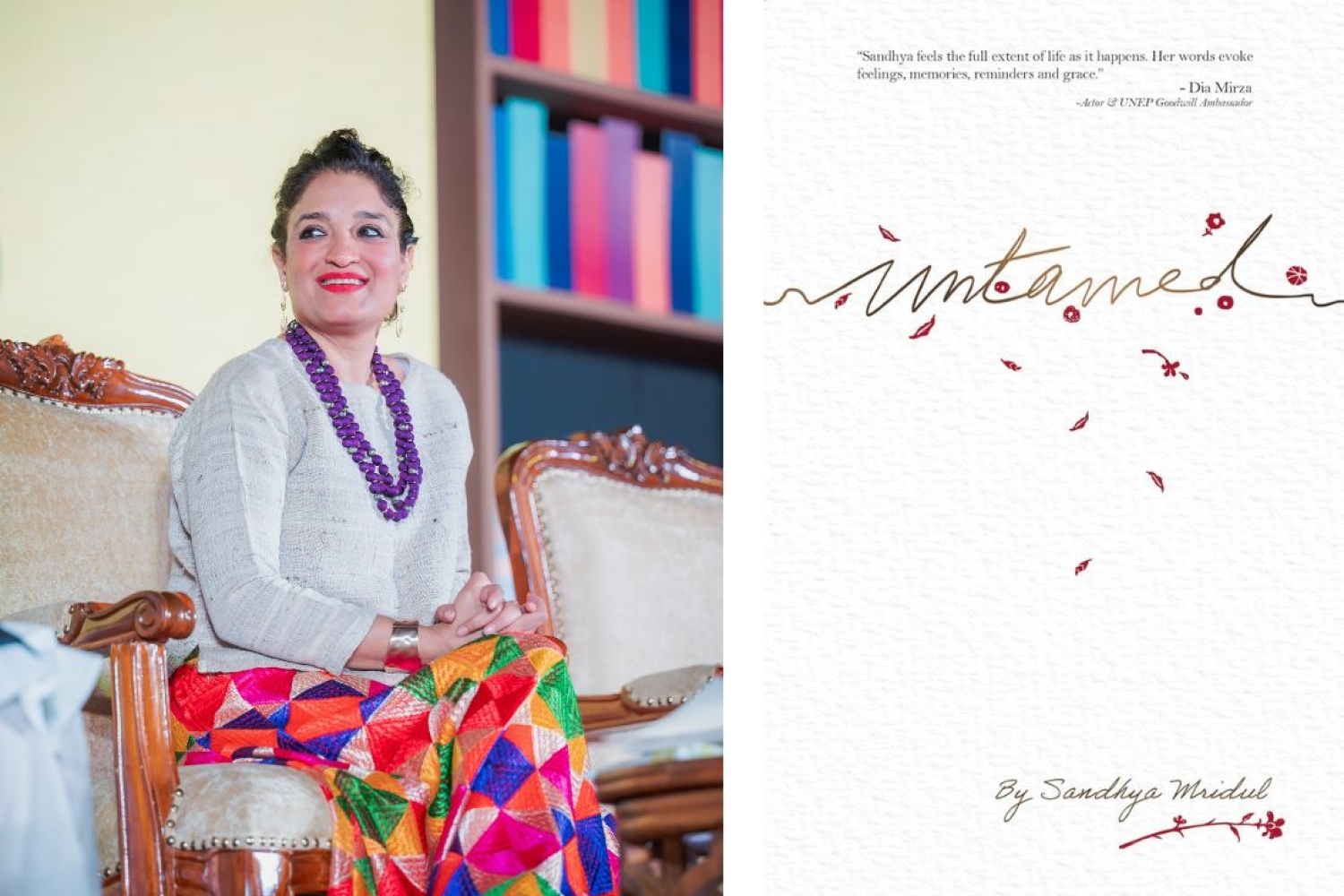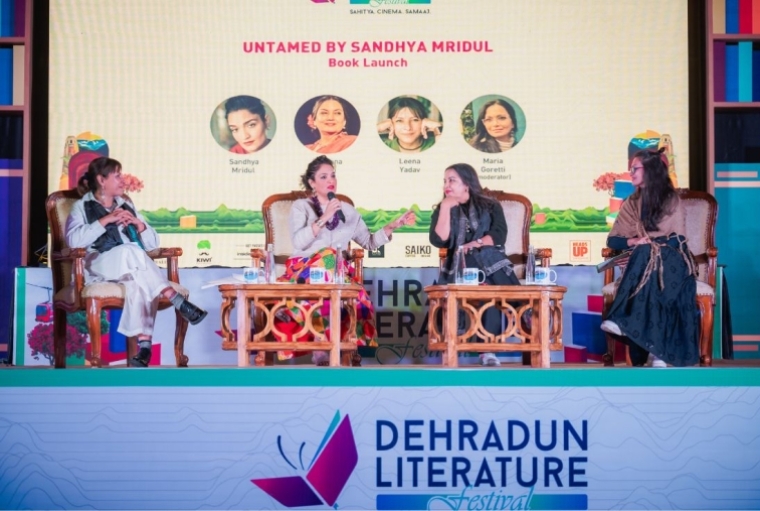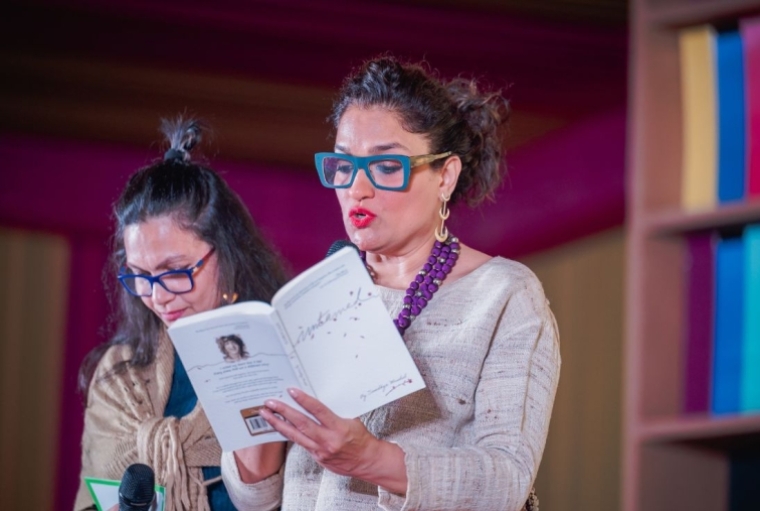

Actress Sandhya Mridul, known for her captivating performances on screen, has entered into a new realm of artistic expression with her debut poetry book Untamed. The book, inspired by her personal experiences, dives into the emotions of grief, love, loss, and the empowering force of womanhood. For years, Sandhya has built a reputation as a bold and defiant figure in the industry, but through her poetry, she unveils a more vulnerable side of herself—one that resonates with authenticity and healing.
At the Dehradun Literature Festival this month, where she launched her debut poetry book along with Shabana Azmi, Leena Yadav, Maria Goretti, she talks to us about her unexpected journey into poetry. She didn't set out to become a poet—rather, poetry found her.
You've been acting for so long, and acting is a unique form of expression in itself. So, I'm curious to know, what made you turn to poetry?
Nothing made me turn to poetry. It just started happening. I've never really tried hard to be anybody; that's not in my nature. About a decade ago, flashes of two lines here and there started coming to me, and I would pin them somewhere, then forget about them because I didn’t think it was anything serious, or that I was going to do something about it. But over time, whenever I was lying down, something would come to me, and I’d suddenly type it in my notes. The frequency of these moments just increased.
I think as the world turned, especially after COVID, there was so much pain and loss in the collective energy. It really became the only way for me to find any respite—by putting everything down on paper. I used to write with a green pen in a diary because somehow, green to me is a very healing color. That became my thing. I’d finish all my housework—since I was alone, my girl wasn’t with me—and after that, I would sit down at 11:30 with my coffee and write. It became my only form of expression and outlet. But even then, I didn’t think I was working on a book. It was never a plan. I just kept writing.
Then, last year, my friends and family started encouraging me to put everything together. They’d say, "You know, you have something here, you should make a book." It all just happened organically. I met a publisher, I met an agent, and they said, "We love it." And I was like, "Are you sure?" I couldn’t say I put effort into it; I put my soul into it, but it didn’t feel like work. It just flowed.

What was your writing process like? You’ve mentioned you were writing snippets of poetry here and there, but how did you formulate the entire book?
That only happened this year after I moved to Delhi. I decided to come back home, step back, and take some space. I thought, "Why not edit my poems?" My publisher said that if you need to edit anything, just send it to us. Then, I had to learn technology—how to transfer my handwritten notes onto an iPad, how to use an app, make PDFs, all of that. I had to throw out a lot of material, and I rewrote a lot of stuff. For about a month or two, I focused on editing. I realized I had about 300 poems—some long, some just two or four lines. It wasn’t until July or August that it became serious, and I thought, “Oh my God, I’m actually putting a book together.”
At that point, I didn’t even have a name for the book. I’ve never liked forcing things, so I wasn’t pushing for a title. It didn’t come to me until the very end. Even then, my first choice wasn’t Untamed—it was another title, but that one didn’t stick. Untamed was actually the third name that came to me, and I’m glad it did. I think it’s the perfect one.
Your book is deeply personal, inspired by your own experiences. Writing poetry based on such personal reflections can be an act of vulnerability. How did you find the courage to put your emotions on paper and share them with the public?
That work was already done within me. This book is just an extension of that. If you know me, you know I’ve always had this bold image and I can be that person too, but that image fooled me for a long time. A few friends would comment, “You never expose your vulnerable side,” and they'd say I was like a coconut—hard on the outside, soft on the inside. Over time, especially in my late 30s, I started realizing that I am, in fact, a very vulnerable and emotional person. And I had this image of being cool and tough, which didn’t align with who I really was.
When I started doing that internal work, I ultimately became comfortable owning my vulnerability. Once I owned it, putting it out there didn’t feel like a big deal. The real bravery lies in owning it in yourself, not just sharing it with others. So, that journey was tougher and longer than writing the book. Once I made peace with my vulnerability, it wasn’t hard to share.
Social media also helped. People started seeing me for who I really am, not just the image that the press had created. They could hear me, see me, and realize I wasn’t just the “cool, hard-hearted, arrogant” person that some assumed. I’m actually kind, warm, and funny. The more I accepted myself, the easier it became to show up fully, with complete vulnerability, and with confidence in that vulnerability. The book is just an extension of that work on myself. As Shabana Azmi said on stage, it’s a quiet work, but it’s real work. My book is just a continuation of my healing process. I’m sharing my healing now. That’s what it is.

Were there any poets or writers who inspired you?
Yes, there were several. My biggest influence was my brother, who I lost and he was an amazing poet—I want to release his book next. Then, there’s Sylvia Plath, Anaïs Nin, Margaret Atwood, Leonard Cohen—who I absolutely adore—and Maya Angelou. I believe women poets, in particular, have something special. Anaïs Nin has my heart. I can’t even describe how deeply her work moves me. I also love the way Frida Kahlo expressed herself through her writing, even though she wasn’t strictly a poet. She used words with softness, but I like to own the anger, bitterness, sadness, and brokenness in my own work. I don’t shy away from those emotions, and I think I’m inspired by great women who didn’t shy away from anything.
What do you hope readers take away from your poetry?
I hope they find some healing in it. I hope they feel resonated with it and that it encourages them to embrace their vulnerability, to express themselves freely. So far, from friends and family who have read it—including those who launched the book with me, like Shabana, Leena, and Maria—many have said it made them cry, reminded them of something they had felt but suppressed. I really hope this book opens everyone’s hearts wide, letting go of whatever they've been holding onto, whether it’s repressed or suppressed. I want them to give an outlet to the love causing them grief. That’s what happened to me through writing this, and I would love for that to happen for others. When I look at the book, I still have to remind myself, “Oh my God, this is my book.” Every day, it’s like, "Wow, I really did this!" I don’t even know when it’s going to fully hit me.
Words Paridhi Badgotri
Date 21.11.2024